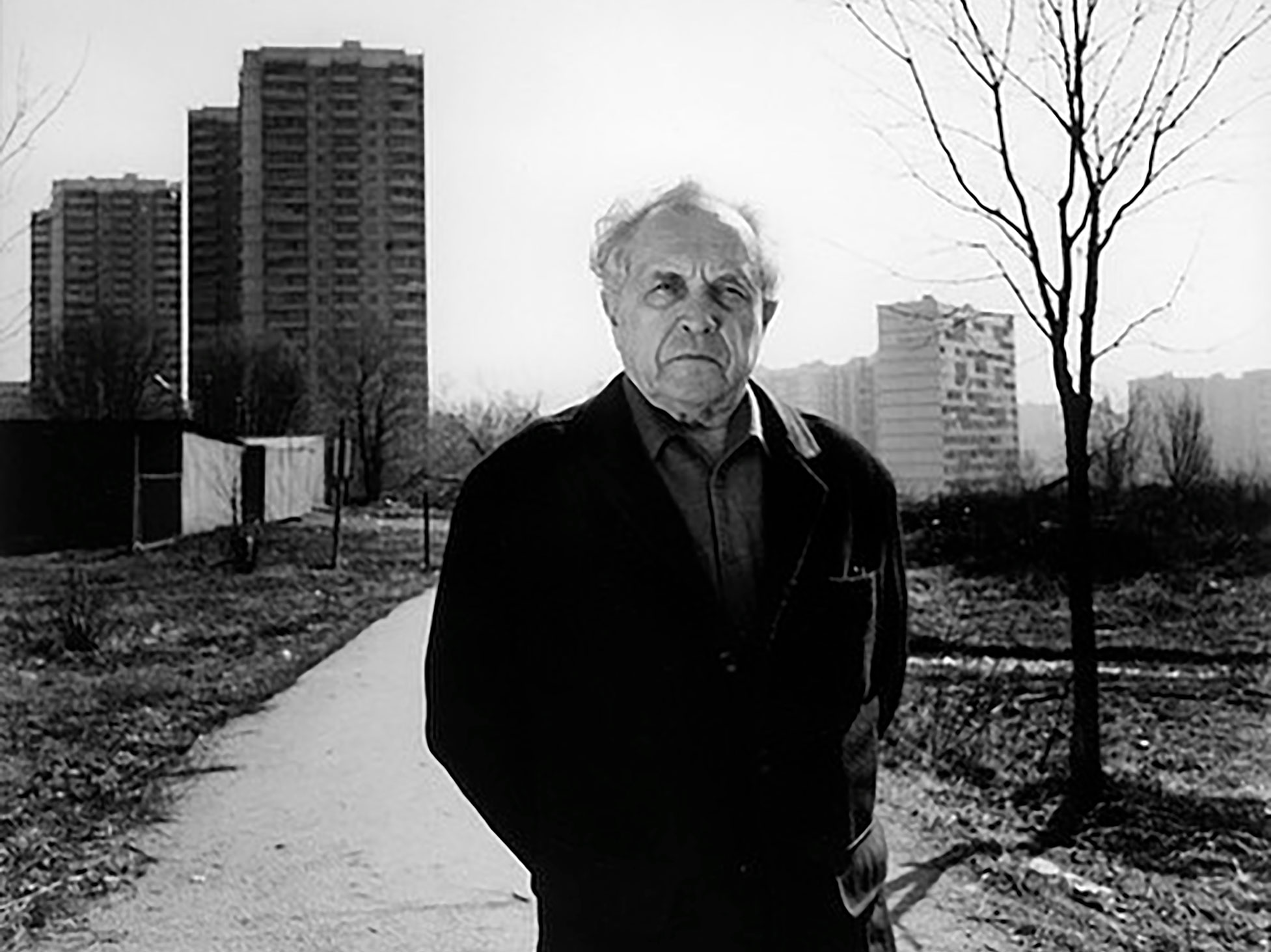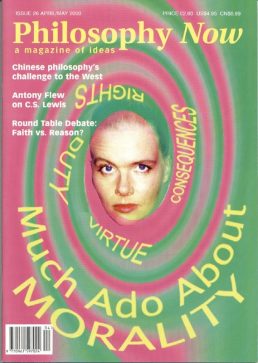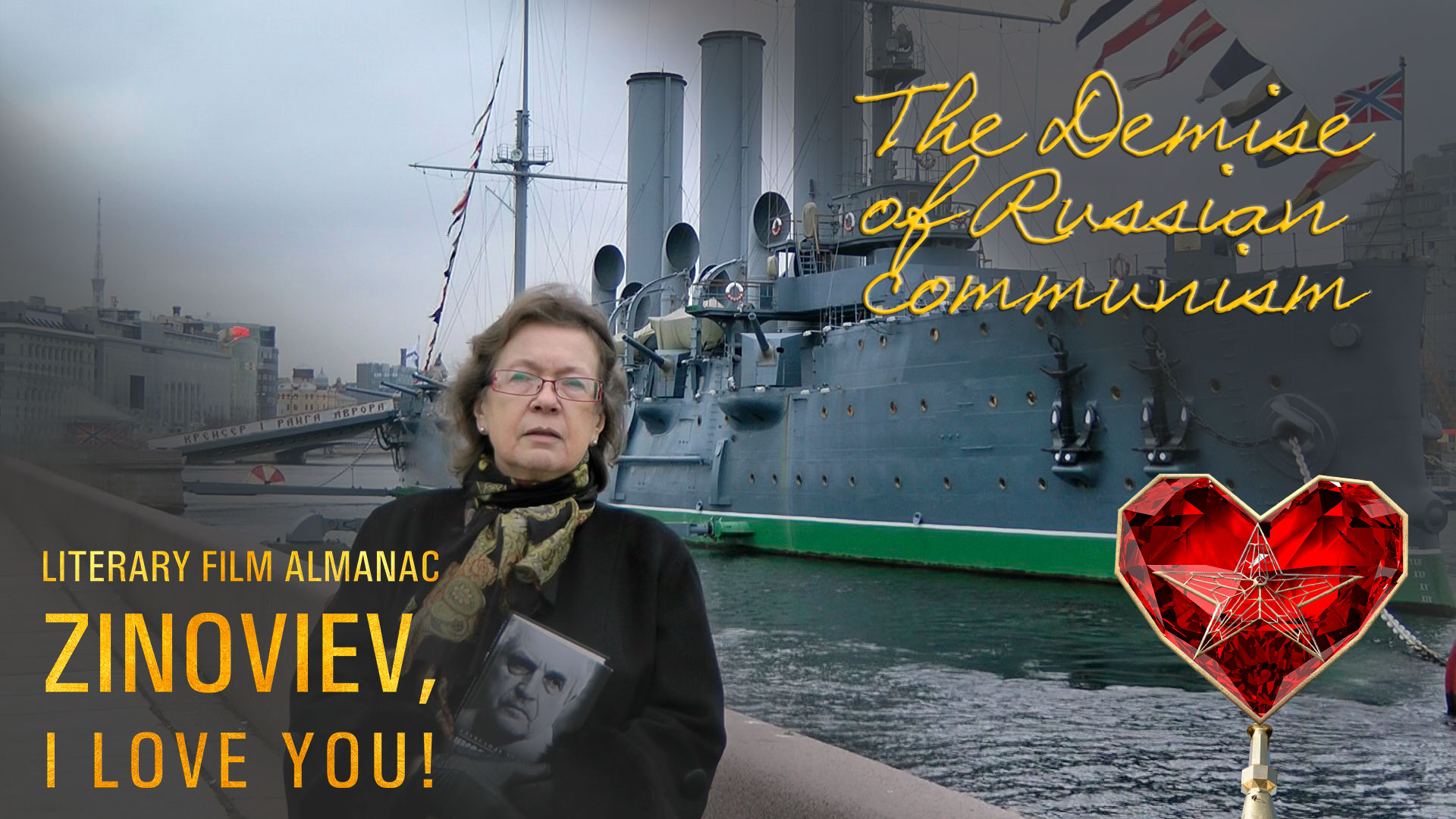
Philosophy Now – Issue 26. April/May 2000
Alexander Zinoviev is a scientist, a writer, a painter, and a member of the Department of Ethics at Moscow State University. The author of many books analysing contemporary society, he was for over twenty years an exile in Germany, and became a German citizen. Now he has returned to Russia. This interview is by his colleague in the Department of Ethics, Professor Alexander Razin (a contributing editor of Philosophy Now).
Professor Zinoviev, you are well known to Western readers as the author of works which criticized the former Soviet regime in Russia. Your idea of ‘Homo Sovieticus’ has entered the contemporary political and philosophical lexicon. Why did you leave the Soviet Union, and why did you recently return to Russia?
I didn’t leave the Soviet Union of my own will. I was under the danger of arrest. Because of the publication of my work, in which I criticized certain Soviet party members (a crime at that time), I was threatened with seven years in prison and five years of banishment in camps after that. My family was also to be sent to Siberia. As an alternative, it was suggested that I leave the Soviet Union. So, given the choice of twelve years of being a prisoner or immigration to some Western country, I chose immigration.
What year was that?
1978. For almost twenty-one years after that I lived in Germany. I was stripped of my Soviet citizenship, and the publication of my works in the Soviet Union was forbidden. The people who spread my works were punished and some were even arrested. In 1990 I was given my citizenship back, and thought of returning. But my return was delayed, because it was not easy to do this. Conditions in Russia were still unfavorable, my books were still boycotted, and only in the past two years has this really changed. Some of my works began to be published, and people began to relate to me with a friendly attitude. When the possibility to deliver public lectures was given to me, the practical possibility of returning arose. It was only on June 30, 1999 that I officially returned to Russia.

I know that you have many publications in Western countries. Could you talk about the most interesting books that were published in English?
There are some special works in logic: Foundation of the Logical Theory of Scientific Knowledge and Philosophical Problems of Many-Valid Logic; works in sociology, such as The Waving Height; The Radiant Future; Homo-Sovieticus; The Reality of Communism, and Katastroika. I originally worked in the field of logic, then applied the methods of logic to the explanation of the physical world; and then applied logical methods to the investigation of society. All these works were written during a long period of time, and I had to work intensely when I was an emigrant, because I was not a dissident. I did not have any support, I did not collaborate with organizations which worked against the Soviet Union in the field of ideology. Therefore, my books and my public lectures were the sole source of my income. In order to live it was necessary to write two or three books per year, to deliver lectures in all possible places, at all universities that were interested in my ideas.
What was your principle disagreement with the former Soviet regime?
I did not have any principle disagreement. I am an investigator. In my younger years, because of my life conditions, I became an anti-Stalinist and a critically oriented person. Later I became interested in why Soviet society did not answer to the ideals of communism. I began to investigate Soviet society and passed from my previous emotional attitude to an exclusively academic one. It became an intellectual curiosity. All the books which I wrote about the Soviet Union actually represent the result of my intellectual reasoning, and are not the result of some political position. I did not intend to be a writer, this was caused by accidental circumstances. I always wanted to be a scientist, and was oriented to the objective description of reality. Now I am glad that I am free from literary work and can return to pure scientific investigations. I always did scientific work, but at the same time it was necessary to spend much time on literature and publicity.
You are now working at the Philosophy Faculty of Moscow State University. What can you say about your lecture course?
I deliver a course in what is called ‘Logical Sociology.’ It represents the analysis of social problems through the investigation of language. This is not directly the view of a sociologist, but rather the view of a logician interested in sociology. My course is interdisciplinary. It is attended by students from all the different departments, and even from scientific organizations.
Your latest book, Global Manhill, has already received some reviews in the West. Can you say something about the main ideas of this work?
Some critics have called this book ‘The Waving Height of Westernism.’ Indeed, my earlier book The Waving Height (1978) was an examination of the communist system. And everything I described in it can be applied to contemporary Russia. Moreover, many Western readers had told me that it could equally be applied to Western countries. Vice-versa, Global Manhill, although written about the Western countries, can equally be applied to contemporary Russia, because it goes in the same direction. The book has the form of a futurist novel, but in reality, I describe by literary means (the same as in The Waving Height) contemporary Western society. To be more correct, I describe the Western contemporary society which has been organized in the second part of the Twentieth Century and which has acquired a tendency in the Twenty-First Century to develop in the direction of a global or (to use my terminology) ‘above’ society. I think that this novel, side by side with my sociological work which is called Westernism, is the first work about the evolution of the contemporary world in the direction of above-society. This society is the new stage in the evolution of humankind. So these works are prognoses.
What are the positive and negative features of this society, and what kinds of dangers does humankind face?
I do not analyze problems from this point of view. I just try to understand what will happen to humankind if it goes in the mentioned direction. Many people see this as a critique, but I am not a critic, I am an analyst.
In my works I have built my sociological theory on certain notions, in particular the notion of ‘manhill’, with the analogy of an anthill. This category embraces local communities of former times, contemporary societies, and the future above-societies, e.g. manhills are separated as before-societies, societies, and the future above-societies. The classical variant of societies is represented by contemporary Western countries. The example of abovesociety in its communist variant was the Soviet Union. In the West, the American manhill is the closest to the stage of above-society. At the present moment, the above-society on a global scale is forming. This society is arising above the Western world. I suppose that in the second part of the Twentieth Century the global turn in evolution of mankind has begun. The result of this turn is the new world order which is organizing under the leadership of American society. This is the objective process that cannot be evaluated in terms of good or bad. I do not use notions of this kind. You as a philosopher know that any progress at the same time turns out to be regress to some degree. Something from the former achievements disappears, but at the same time something new is acquired. The contemporary situation is this: West European civilization is being surpassed by the Westernist above-civilization, e.g. it organizes itself and becomes the kind of culture that is already not a civilization. This appears to be the beginning of a new form of totalitarianism. I call it ‘the democratic totalitarianism’ or ‘totalitarian democracy.’ And again, I do not put in this notion any negative meaning, just as I do not put any negative meaning in the notion of ‘communist totalitarianism.’ The Soviet Union had both communist democracy and communist totalitarianism in its history. These stages of a society’s transformation are the general appearances represented in different forms. Of course, in Global Manhill I express this future above-society in satirical form, but not because it is bad, but because I am a satirist by nature. I wrote about Soviet society in satirical form not because I hated it. No, Soviet society was my society. I was educated in that society and I am still a man of that society. I am 77 years old, and it is too late for me to change. But as a satirist I saw curious features of Soviet society. And as a satirist I see the Western world in satirical form, too. But satire is not negation. Should one consider the critical writings of Swift or Rabelais to be a negative attitude toward the society they lived in? Not at all.
But satire is at the same time always oriented toward the expression of some negative features of society.
Yes, that is right, but the fact is that the positive features are described by thousands of writers and scientists other than me. I am concerned with the negative features.
What is your view of contemporary Russia? Do you think it possible that the communist ideology will be resurrected in some new variant?
I think that the communist system in Russia has been destroyed completely. It is not possible to restore it. There are no conditions for this. I investigated this in detail in a number of my earlier books. There are no ideological conditions, because communist ideology in its Marxist variant has failed. It became inadequate to reality, and it now lacks fanatical or pragmatic followers. The system of power and management has been destroyed. To resurrect this system in the image in which it existed in the Soviet Union, to resurrect party machinery and the communist party itself (the Soviet system cannot be conceived without these elements) is not possible. The economic system now is also in a state that will not allow the building of a unified command management system. The structure of the population has changed. As is very well known, Marxism oriented itself to the proletariat and the poorest peasants. There are many poor people in Russia now, but they are not peasants. The proletariat in the Marxist sense also does not exist in Russia, or in the Western countries either. In the United States, for example, only 3-4% of its population works in agriculture; in industry, less than 20%. These are not peasants and poor workers staying near their machines. In industry these are mainly people with high technical education, managers, and so on. Marxist ideology was oriented especially to the poorest strata, to the workers. This section of the population is now negligible. The social structure of Russian society has radically changed. According to Yuri Luzhkov, the Mayor of Moscow, there are now two million small businessmen in Moscow. It is not possible to speak about restoration of communism in Russia. Even KPFR, which is the biggest communist party in contemporary Russia, is actually only communist in name. In reality, it is a parliamentary party. In the writings of its General Secretary Zuganov, Marxism is considered only as one possible doctrine and even more attention is devoted to the geopolitical approach. This was absolutely forbidden in the old tradition of Marxism.
But one should not think that communism has passed away without trace. Soviet communism played a great role. It put its own stamp upon the evolution of the whole of humankind. The Western world adopted many things from communism. Communism and Westernist ways were the two main causes of the above-society. The difference between the two ways can be compared to the difference between a dolphin and a shark. Both of these animals live in water and each essential element of one can be correlated with the element of the other. At the same time, these animals are primarily different.
Now let us take a look at contemporary Russia. The transformation that happened in Russia is serious and irreversible. A new social and political system arose, under the influence of two factors. First of all, there is an objective social law of historical continuity – as I call it, the law of regeneration. The essence of this is that if the old social system has been destroyed, but the conditions for its existence remain, the new social system appears to be maximally close to the former one. The post-Soviet system arising now in Russia reproduces many features of the former Soviet system. There is a new terminology in use, but from the sociological point of view this is the continuation of the Soviet system, just as the Soviet system was itself the continuation of the pre-Revolutionary social system of Russia.
The second factor is the pressure from the West. The West defeated the Soviet Union in the Cold War. We are a conquered country, and the winner dictates his conditions to us. He imposes the social system that is preferable to him. By this cause the stamp of Western pressure is put on the social system I have described. It appears as a multiple political party system, with mass media based on a Western pattern. The former communist ideological machinery has been changed, and it is now mass media. Mass media are the ideological above-power of Western society. They are the new Vaticans. In this respect the evolution of Russian society is very close to that of contemporary Western countries. Russia occupies a particular place in the global world society, and this place is much lower than the positions of Western countries. It is a big question whether Russia can rise to the level of such countries as England, France, Germany, Canada, and the USA. I personally doubt it. Geopolitical conditions in Russia are very unfavorable. The populations are distributed over vast territory, the climate conditions are very hard. The Russian populace is declining in numbers, and life expectancy is falling.
The problem of a possible new ideology is now widely discussed. What can be the new ideology of Russia?
This searching for a new ideology just makes me laugh. Ask those who discuss it ‘What is ideology?’ I am one hundred percent sure that none of them will give the appropriate answer. Why do people speak about a new ideology? They are trying to find some new magic wand. They suppose that if they invent a new ideology and pass it on to the masses, then the masses will act according to this ideology as it is desired. This is naive. Politicians speak about a new ideology but do not understand that they are already up to their ears in an ideology. First of all, Western ideology flows into Russia, and has captured people’s consciousness. It has a pluralistic image. As a philosopher you know the West has enormous numbers of philosophical schools, many religions, and religious tolerance. As I already mentioned, the new Vaticans are the mass media. The publishing of Western books, the showing of Western movies is taking place in Russia on a huge scale. There is extensive and intense brainwashing in religion as well. Orthodox beliefs flourish to a great extent. The Orthodox Church has become very influential. Many people are rushing to it. Isn’t this ideology? Television programs are soaked with ideology. Give me any journal, and I will show you that it consists of at least 90 percent ideology. But when politicians say ‘ideology’, they want to find something else – a teaching which looks like Marxism, that can be expressed in a little book, which can be transferred to the masses and do everything with them after that. There is no ideology in this sense in Russia, and it is not possible now.
Thank you, Alexander. Would you like to add any thing further?
I can add the following. When I was a young man, I was lucky in the sense that I was born and grounded in the Soviet Union. I was lucky not because everything around me was communistic, but because all the social processes that I was interested in could be observed in the same way as in a laboratory. And I am lucky now, too. I find myself in post-Soviet Russia, and what I see here is a paradise for an investigator: the possibility to see all the social processes of a new type of human community. Until recently I worked alone as an investigator, but now I am organizing a scientific center. I hope to convert it into a serious organization for the investigation of contemporary social processes. I invite the readers of Philosophy Now who have a particular scientific interest to cooperate with it.



